#Phrasikleia
Text
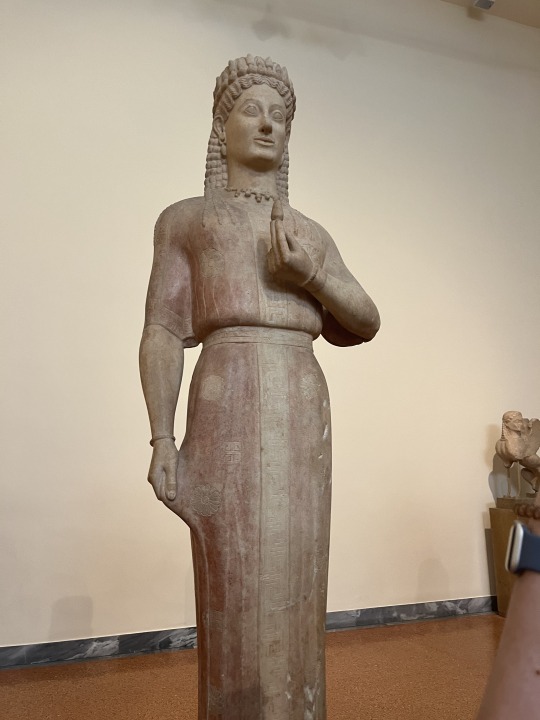
The Phrasikleia Kore is an Archaic Greek funerary statue by the artist Aristion of Paros, created between 550 and 540 BCE. It was found carefully buried in the ancient city of Myrrhinous (modern Merenta) in Attica and excavated in 1972. The exceptional preservation of the statue and the intact nature of the polychromy elements makes the Phrasikleia Kore one of the most important works of Archaic art.
7 notes
·
View notes
Text
















The Met ~ 09/27/2022
For my trip to The Metropolitan Museum of Art today, I decided to focus my attention on the temporary exhibition, Chroma: Ancient Sculpture in Color, since it may not be here the next time I visit. This exhibition puts on display polychromatic recreations/replicas of some of the famous Greek and Roman statues we typically think of as solid marble in its natural all-white coloring or the untouched surface of bronze. Historians have discerned that these classic monochrome ancient artworks were actually, at their original time of creation and display, painted with many bright, expressive colors. This exhibition displays multiple 3D printed and hand-painted recreations of how the sculptures on display today likely looked thousands of years ago.
I entered through the left side of The Great Hall and was immediately surprised by the subtlety and scattered nature of the featured pieces. Yes, the Reconstruction of the marble funerary statue of Phrasikleia was front and center right away upon entering the Greek and Roman Art hallway, but aside from her, I was not seeing nearly the amount of pigmented portraits I was expecting. I knew the exhibition was spread out amongst thirteen different closely-related gallery rooms, but I was not anticipated the little number of colored replica statues that I ended up seeing. The Greek and Roman Art space was as white and spacious as ever. The informational Chroma posters and large description plaques were mostly just black with white text. Although I found this a bit ironic considering the subject matter, I thought the completely neutral color scheme of the text material and the Met walls/floors was completely appropriate for the exhibit, so that no additions were unnecessarily taking away from the main aspect of the show.
Once I walked around and was able to discover and observe all of the Chroma replica pieces, I came to appreciate the setup much more. The Greek and Roman Art section at The Met is so grandiose and elegant. It has white walls, high ceilings, bright windows, and a tiled mosaic floor that compliments the permanent works in the collection beautifully. Each connected gallery is filled with so many dignified marble statues and architectural fragments that your eye almost doesn't know what to look at at first, usually. But with Ancient Sculpture in Color on display, my eye immediately discovered the new additions when quickly scanning the spaces.
My favorite moments of the exhibition were the replicas that were displayed directly next to or surrounding their authentic, original inspiration. I enjoyed comparing the colorful Caesar's bust to the monochromatic ones I am used to seeing in museums and history books and imagining it being displayed in Ancient Rome in all its colorful glory. I found that whenever a colorful replica was displayed on its own, or in a separate section than its original, such as the reconstruction of a marble archer in the costume of a horseman, I found it to be a much less interesting experience. I enjoyed being impressed by the direct comparison of original and replica and allowing my eyes to travel back and forth between each piece during close observation.
Although I, of course, trust the historians and artists who worked on the replicas for this show, at times I did take note that the painting style seemed much less realistic, elegant, and refined than the actual sculpting style of the statues underneath. I wondered about this disconnect and wished I had more information on how the researchers on this project had come to the conclusion of what original colors had been washed off the works by history. I finally got answers to my questions when I reached the portion of the exhibition in the Mezzanine area (which I definitely would not have found had I not picked up a special Exhibitions Program pamphlet at the ticket counter). Upon walking up the stairs next to the famous big marble column, I arrived at a small, discreet room with a few display cases, some more replica art, and a couple of screens playing slides and clips that yielded much of the information I had desired downstairs. It was here that I learned about how scientists can study particles of leftover materials engrained in the statues' surfaces and match them to materials used in certain pigments used back in Ancient times. Another screen provided a detailed timeline of the recreation process. The display cases showed smaller, less damaged original artifacts which had paint jobs that survived well enough to convince me that the replicas were, indeed, true to the original Ancient Greek and Roman painting styles. The room was empty when I arrived in it, and I had wished that it was made more obvious to passersby that this was an important extension to the Chroma: Ancient Sculpture in Color show, in which many visitors seemed interested enough to want more background on. Also a note, there were elevators up to the mezzanine, but I think putting the most informational portion of the exhibition in a more accessible location would have been a better move.
Overall, I thought I knew what to expect going into this exhibition but I quickly realized I was wrong. I was surprised, however, not disappointed. I enjoyed how the exhibit pieces were spread out. It was a bit confusing at first (as is the Met in general to newcomers). I personally enjoyed having to explore a little to find all the pieces, but I'm not sure that part of the experience would appeal to everyone. I do respect how the curators managed to fit in each new work in an appropriate way. If one was unaware that this was a temporary exhibit, I don't think the Chroma pieces would have stuck out as something that did not belong. The biggest thing I would have changed would be putting the informational background videos and original color sculptures either at the beginning of the exhibit or having much clearer signage and directions to get to that portion of the show. I might also have put at least one recreation in each room, so as to eliminate confusion about whether or not the exhibition spans the entire Greek and Roman wing or not, as there were multiple times that I thought I had come to the end of the show when, in fact, there was still more to be seen in other rooms.
2 notes
·
View notes
Photo
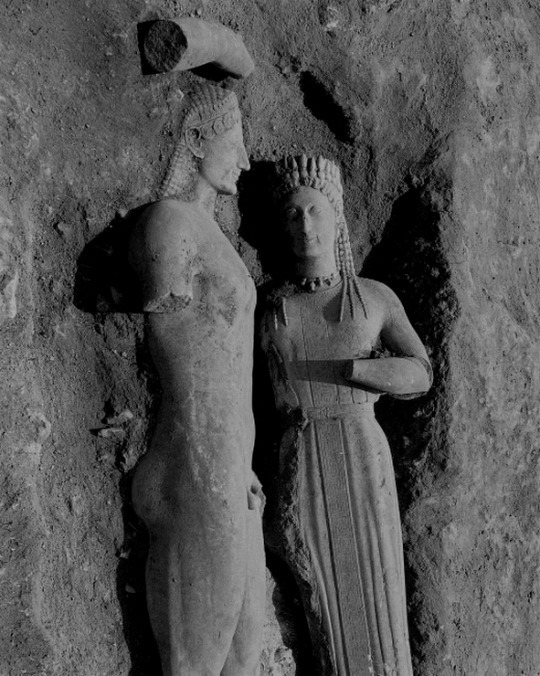
Archaic statues, 6th century BCE. The kouros of Merenda and kore Phrasikleia as found on May 18, 1972 in the cemetery of ancient Myrrinounta to the west of the road from Markopoulo to Kalyvia of Attica.
3 notes
·
View notes
Text
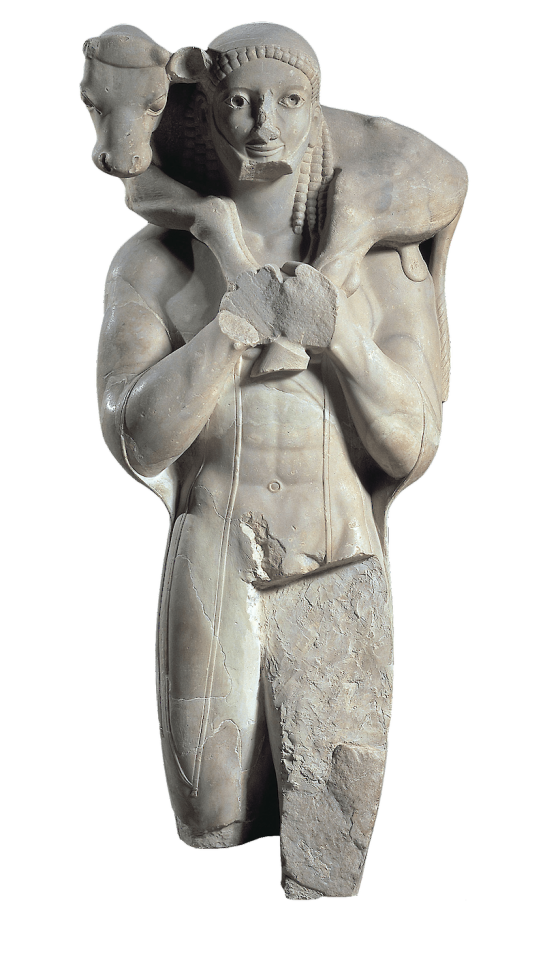
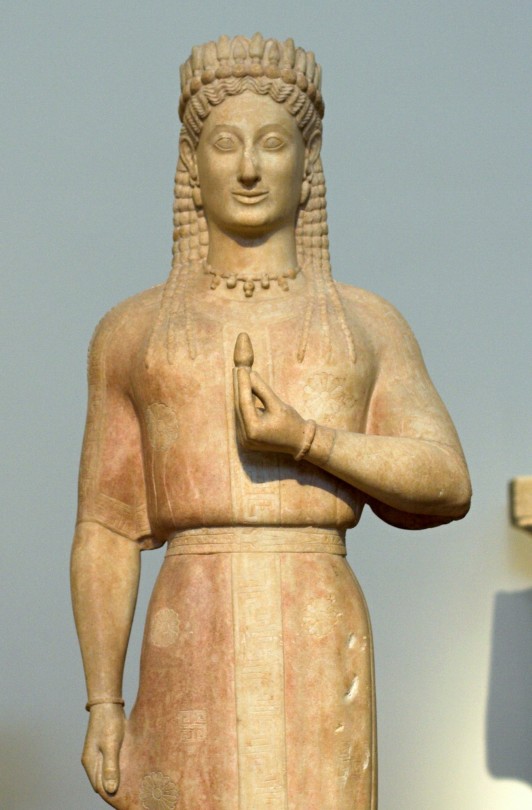
i love you moschophoros i love you phrasikleia kore i love you archaic smile
4 notes
·
View notes
Text
The Phrasikleia Kore

The Phrasikleia Kore, Archaic Greek funerary statue (ca 540 BCE) by Aristion of Paros, excavated in 1972 in the ancient city of Myrrhinous in Attica and currently at the National Archaeological Museum of Athens.
This is one of the finest examples of an Archaic kore (maiden). It is in very good condition and with much of the original painted decoration preserved. It is the funerary statue of maiden, whose name, Phrasikleia, is inscribed on the pedestal along with that of the sculptor, Aristion from Paros. She stands frontally, her slim and youthful body clad in a long chiton, decorated with incised and painted motifs. She draws up the side of the chiton with her right hand, while she holds a lotus bud near her chest with her left. A blossoming wreath adorns her intricate hairdo and precious jewelry decorates her head and arms. This statue was buried together with a kouros (naked youth) statue in antiquity.
Exhibit Features
Date: Archaic period, 540 B.C. Place of discovery: Attica, Attica, Merenda (ancient Myrrinous), Mesogeia Dimensions: length: 0,58 m (base), width: 0,57 m (base), height: 2,115 m, base height: 0,26 m
Material: parian marble Inventory number: 4889 Exhibition hole: Exhibition hall 11
Source:http://odysseus.culture.gr/h/4/eh430.jsp?obj_id=5441
3 notes
·
View notes
Text
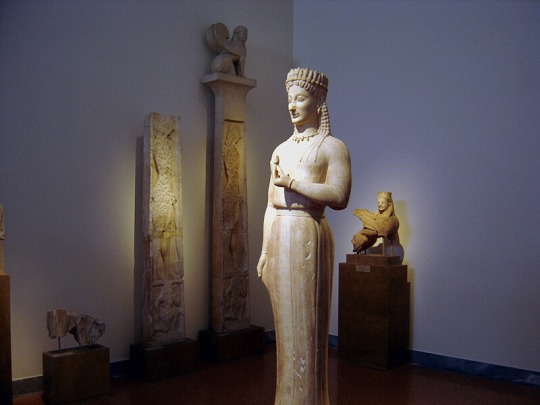
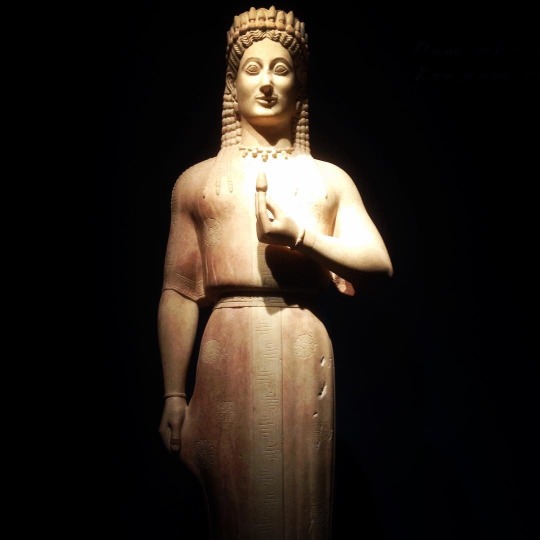
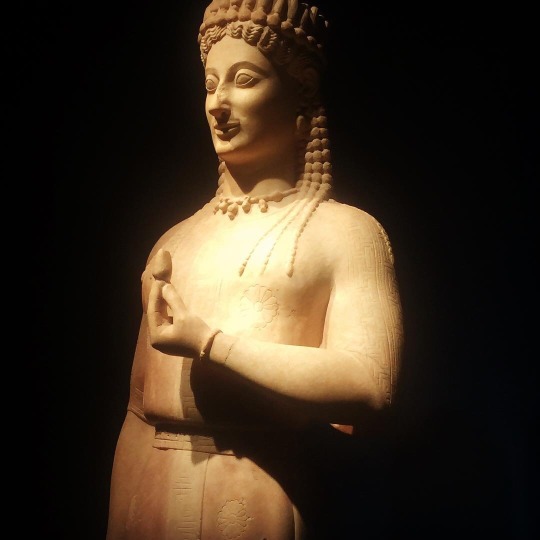
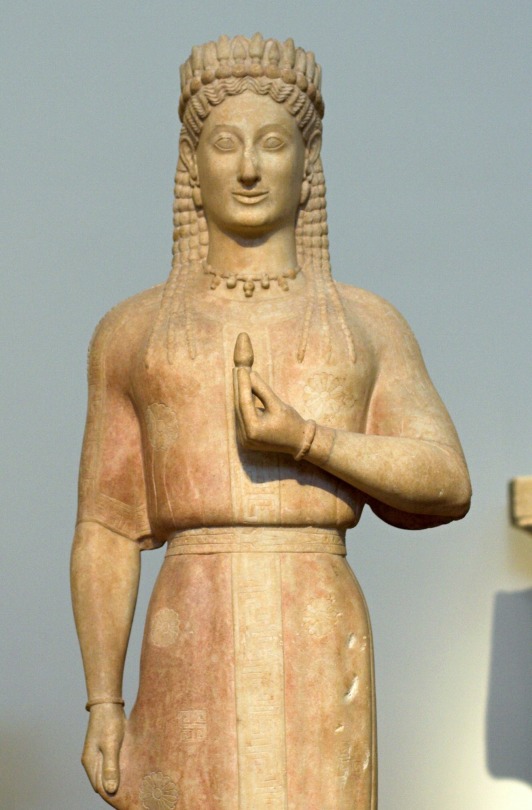
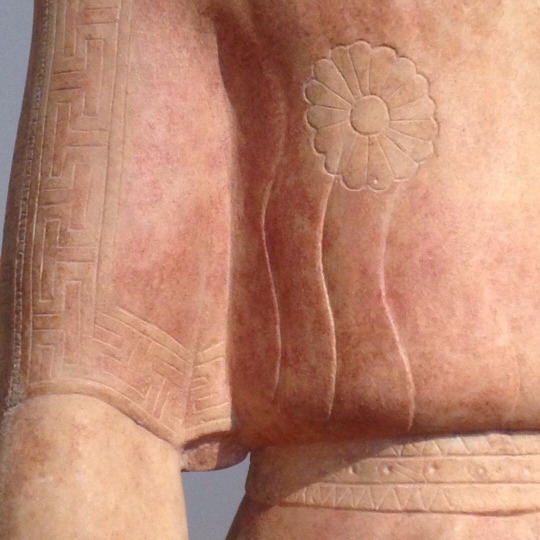
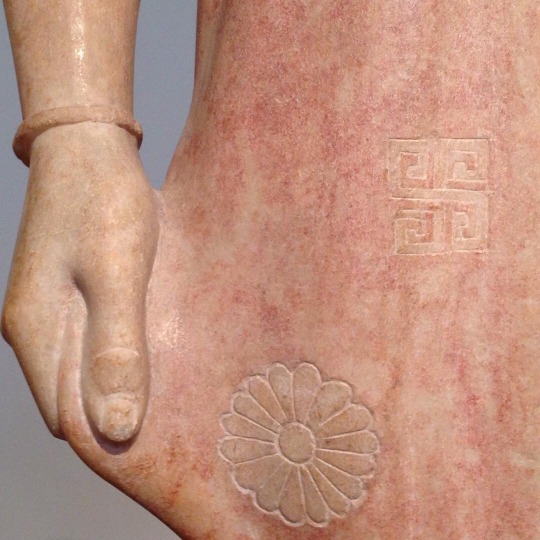
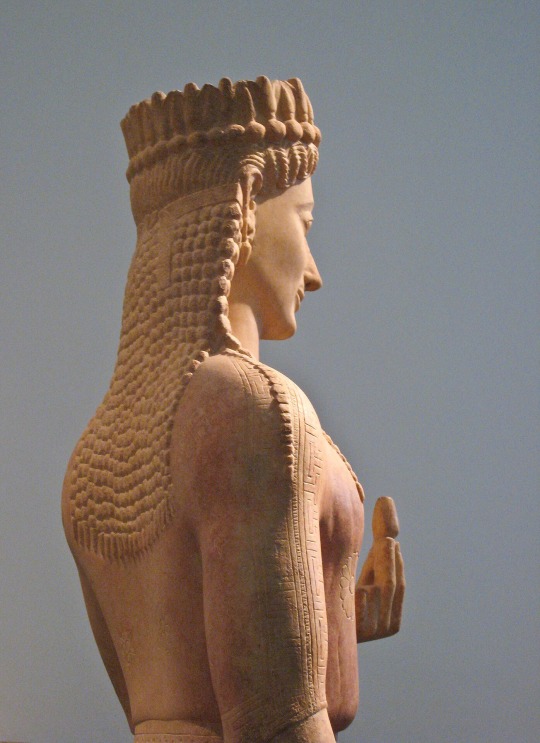
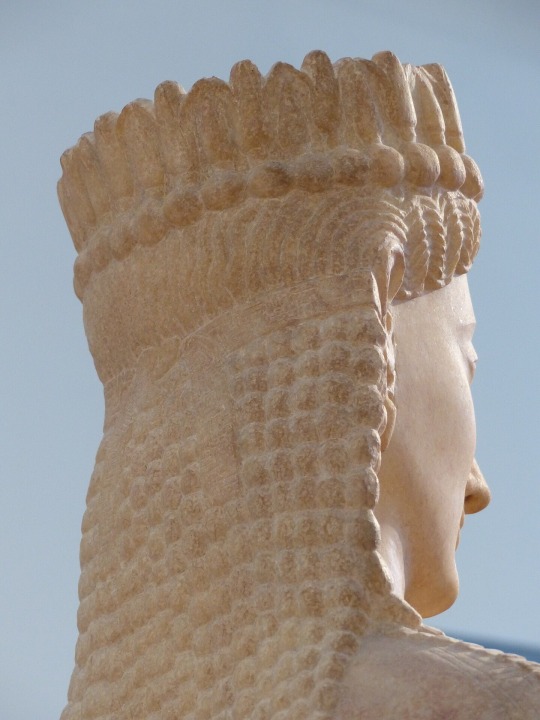
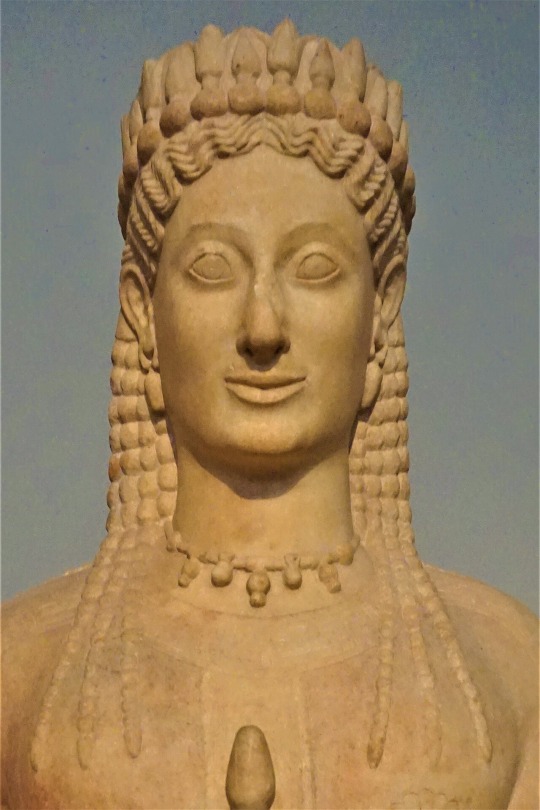

The Kore of Phrasikleia is a beautiful sculpture dating from approximately 550-540 BC, belonging to the archaic period of Greek art and sculpted by the artist Aristion of Paros.
He is presented to us from the front, with a deep look that enhances his elegance.
833 notes
·
View notes
Photo
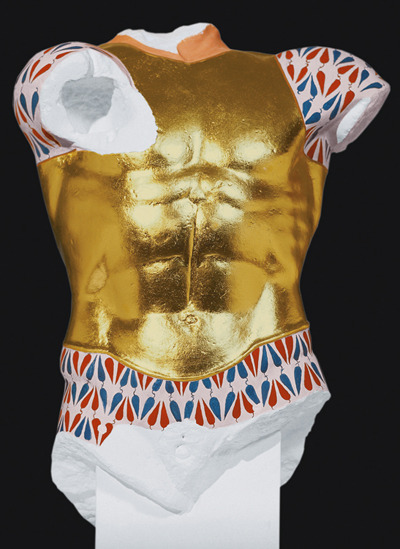


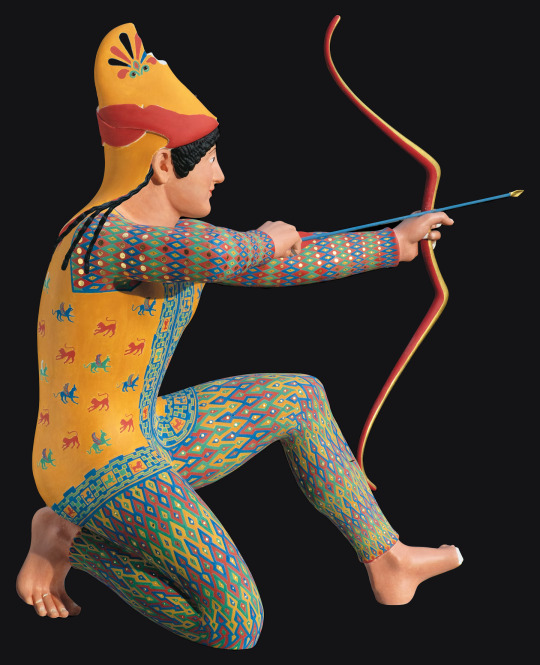
Other examples of the Liebieghaus Polychromy Research Project’s reconstruction work in recent years.
Curaissed Torso from the Acropolis in Athens, original sculpture from c. 5th century BCE
Athena from the west pediment of the Aphaea Temple, original sculpture from c. 5th century BCE
Phrasikleia Kore Funerary Statue, original sculpture from c. 6th century BCE
Archer from the west pediment of the Aphaea Temple, thought to be Paris of Troy, original sculpture from 5th century BCE
#image described#ok lol this is the last one for nowwwwww#history#mythology#art history#greek mythology#mythos#polychromy
3 notes
·
View notes
Photo
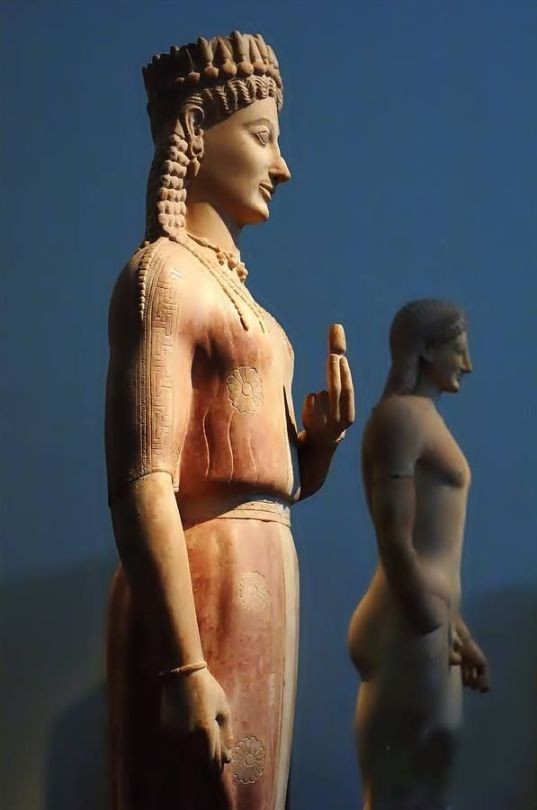
Phrasikleia Kore is an Archaic Greek funerary statue by the artist Aristion of Paros, created between 550 and 530 BCE
77 notes
·
View notes
Text
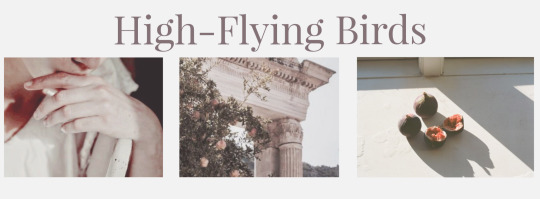
Fandom: The Song of Achilles
Pairing: Achilles/Patroclus
Chapter 12: Still Waters of High-Flying Birds is up! This the second of the chapters that follow Achilles during his time in Skyros. Some light angst and pining, and Achilles getting to know Deidameia and the other girls a little bit better.
Read here or on AO3 | Read from the beginning
The unwrought wool was coarse and rough as Achilles rubbed it between forefinger and thumb. Deidameia had shown him how to spin it, thread it, coil it in loose skeins. He had been at this all morning, and now they were amassing in neat rows by his side.
Pagona, one of the maidens, was sitting beside him, working on her embroidery. She liked to sing as she worked, and sometimes the other girls joined her, but the hall was mostly quiet now. It was a lazy afternoon, and most of the girls had gone to rest, while Deidameia and her closest companions had stayed in the dancers’ hall.
The princess had swiftly taken a liking to him, keeping him close by her side wherever she went. Why that was, he could not tell, but he had soon found out that being on her good side was preferable. She was a noisy, demanding thing; her temper tantrums were known and feared the palace over, and not a few girls had received the sharp edge of her tongue in the short while Achilles had been there. Yet, with those in her favour, she was witty and affectionate, and surprisingly generous with her gifts and praise. Of Achilles she was particularly fond; she would often sit beside him and watch him work, or ask to braid his hair, or listen with avid interest when he played the lyre. Achilles quite liked her, actually, most of the time.
Achilles lifted his eyes from his work to gaze outside the lone window of the hall. The sun was hanging in the middle of the sky now, golden rays that made the sand and the sea far below glow iridescent in the light. If he listened carefully, he could hear the waves that rolled rhythmically against the shore, the wind that stirred the branches of the short pine trees close to the beach. Sea birds were flying high, gliding smoothly over water and land alike.
He sighed, the balls of wool forgotten in his lap. He longed to leave the stuffy room, to run down to the beach and dive under the waves. He wanted to stretch his muscles, to race and swim, to practice his spears. No matter how many hours he danced with the maidens, his limbs still felt heavy and stiff, and however long he spent spinning wool and plaiting flowers in garlands and wreaths his mind would just keep drifting from his tasks. Back in Phthia, he could walk to any corner of the palace and the lands beyond completely undisturbed. Here, in this windowless place, where guards stood at every entrance, he could only gaze outside the window, and dream. Almost he wished for another celebration or banquet, just so he could escape this confinement and walk out into the world.
How very dull, a woman’s life was.
“What is the matter, Pyrrha?” Pagona asked him, stirring him out of his thoughts. She had left her embroidery aside, and was now peering at him with tilted hazel eyes. She was from the north, from the mountains west of Vergina, and her accent was thick, her vowels flat and drawn out. “You are very quiet today.”
“I am well,” he told her with his woman’s voice. He suppressed another sigh as he tore his gaze away from the window and went back to spinning his wool.
Pagona watched him as he worked. “You often get this look in your eyes,” she said softly.
“What look?”
“One moment we’re all dancing and laughing, and then you’ll look away and sigh. As if the weight of the world is on your shoulders.”
“I do?”
“Yes,” she smiled. “It’s almost as if you’re in love. Are you?” Her eyes flashed with interest as she moved closer to him, lowering her voice so the other girls wouldn’t hear. “Did you have a... suitor, back in Phthia?”
Achilles frowned. “A suitor?”
“Yes. Or a special friend, if you will.”
Achilles swallowed thickly as Patroclus’ countenance flashed before his eyes. It had almost been two weeks since Achilles had seen him last. At times, he could feel his absence as sharply as an open wound; others it was a dull and ghost-like throb, like a missing limb. The ache was always there, even when he slept, even when he was busy with work or deep in thought. It still seemed impossible to him, right then, that they had spent so long apart. He felt dazed, as if the past several days, ever since he’d woken up on Skyros’ beach, were nothing but a dream. As if his eyes were closed, and when he opened them again he would see Patroclus there, smiling at him.
His throat constricted painfully. He pressed his lips together tightly and looked away.
“There it is again.” There was sympathy in Pagona’s features when she said, “You must really love him.”
“Who?”
Deidameia’s silvery voice pierced the relative quiet of the room. She had been practicing her dancing while one of the girls, Phrasikleia, was playing the flute for her. The music stopped abruptly as both girls stood still now, staring at them.
A mischievous smile widened Deidameia’s lips as she abandoned her dancing form and hopped to his side. “Well? Who is it?”
“Who’s who?”
“Oh, now you’re acting coy! I just heard you say you have a lover ,” she said in a lowered voice, her eyes flashing with enthusiasm. She folded her arms atop his shoulder and batted her eyelashes at him, waiting expectantly for his answer.
“Pagona said that, not I,” Achilles corrected her matter-of-factly, but Deidameia would have none of it.
“I know what I heard. And you, my dear Pyrrha, are blushing. So.” She brought her face even closer to his, until he could smell the faint scent of cloves on her breath when she spoke. “Who is this mysterious friend of yours? I want to know everything about him. Every little thing.”
“I…” Achilles started slowly, but Phrasikleia, who had also drifted closer, spoke up before he could.
“I bet he’s tall like a fir tree and strong like an ox,” she grinned, sitting on a plush cushion on the floor before him, her tight dark ringlets bouncing as she moved. “I bet he has a mighty beard like Ares, and a hairy chest like Heracles, and eats a whole roast pig everyday, all by himself. I bet he tosses you over his shoulder and carries you off to his hall whenever he pleases!”
“Oh, no, I don’t think he’s like that at all,” Pagona said with a chuckle, while Achilles stared at Phrasikleia in utter horror. “I think he’s fair like Phoebus Apollo, with delicate hands and a beautiful smile. I bet he’s very gentle and kind, to have won our sweet Pyrrha’s heart.”
“Nonsense!” Deidameia cut them both off with a dismissive wave. “Neither of you know what you’re talking about. I think Pyrrha has taken a satyr for a lover, short and stubby and ugly like a toad. That’s why she does not tell us of him.”
“What?” Achilles gaped at her. “He is not like that at all!”
She grinned wickedly, holding her tongue behind her teeth. “Ha! So there really is someone,” she said triumphantly. “I knew it!”
Achilles opened his mouth to speak, then closed it once more. The girls were all looking at him with gleeful smiles and bright eyes. Deidameia had laid out her trap, and he had walked right into it. He let out a soft sigh.
“Alright. There is someone,” he finally admitted. The girls leaned closer still, so they wouldn’t miss a word.
“Well?” Deidameia asked. “What does he look like?”
Achilles licked his lips and took a breath. “He… he is not too tall. Same height as me… perhaps a little shorter. His hair is dark, thick with curls. It quite never stays where it’s supposed to. And it’s always so tangled when he wakes, falling over his eyes, standing up in peaks… he tosses and turns in his sleep. I always tease him about it.”
Phrasikleia tilted her head to the side. “He is handsome, then?”
“He is.” He smiled sadly, “He doesn’t believe me when I tell him. He thinks himself quite plain. Yet he is anything but. He is unlike anyone I’ve ever seen.”
His lips quirked in a fond smile, just as his throat tightened once more. He hadn’t spoken about Patroclus to anyone for so long, and now he could do nothing to stop the words that tumbled out of him in waves. It was as if by speaking of him, he could summon his image in his mind, crystal clear. He could almost see his curls bouncing as he ran ahead of him, ducking under the low hanging branches of the maple trees in Pelion, the warm chestnut highlights in his hair catching the light of the early morning sun. His smile, now bright, then soft, then slipping sideways in that way Achilles knew so well. His eyes, watching him with warmth and adoration, with that tenderness that was reserved just for him. It made his heart ache with longing.
“Is he kind?” Pagona asked softly, urging him on. “Is he gentle with you?”
Achilles started to speak, but it was then that he realised that his eyes were stinging with tears. Gods, how he’d missed him. He hadn’t even realised how devastatingly hollow his days had been without him, until Achilles had found himself talking about him. It was too much to bear.
He swallowed thickly and nodded, looking away. He was sure that even if he tried to speak, he wouldn’t have been able to get the words out.
“Oh, dear. Please don’t start weeping, it would be quite the sight,” Deidameia said, but her tone wasn’t quite as abrasive as it usually was. She sighed as she leaned against him, stroking his hair. “I bet you’re pretty even when you cry, anyway.”
The other girls were quiet now, and Achilles could sense the sympathy in their silence. Pagona took his hand in hers, and her large, round eyes were filled with earnest compassion. “You’ll see him again one day,” she said in her soothing voice. “I know you will.”
“Yes, she probably will,” Phrasikleia said, gathering her legs up to her chest and perching her chin on her knees, “but her parents probably don’t want her to marry him. Why else would they send her here?”
Deidameia perked up, her lips widening in that mischievous smile of hers. “Then she’ll have to elope with him! Won’t you, Pyrrha?”
“Oh, stop it, Deidameia,” Pagona laughed. “She won’t elope with anyone. That will only bring shame upon her family.”
“There’s more shame in leaving the poor fellow pining after her! What if she leaves him for good, and he dies of a broken heart?” The princess swooned theatrically, falling into Achilles’ lap. “You couldn’t do that to him, could you, Pyrrha? It would be positively cruel.”
Achilles held her securely before she toppled on the marble floor at his feet. The other girls were chuckling with Deidameia’s antics, but he was as serious as ever. “I will never leave him,” he said solemnly, looking into Deidameia’s dark brown eyes. “I’ve given him my word. This is only temporary. Soon, we will be together again.”
She blinked up at him, taken aback by his earnestness. Her surprise lasted only for a moment before it melted away into a cunning smile. She reached up, tugging a lock of hair free from his scarf, as she often did, and curling it around her finger. “Our beautiful Pyrrha is quite the romantic, it seems,” she said softly, and in her eyes Achilles could see a flicker of understanding before it disappeared under the guise of a jest once more. “Who would have thought, hm?”
~
The moon was hanging high over the Aegean sea, casting its silver glow on its dark, glassy waters. It had been a long day and Achilles wanted nothing more but to retreat to his room, in his solitude, and finally take that dress off him and let his hair fall free around his shoulders. When his candle was out, and if he tried hard enough, he could almost forget that he was in a dark, windowless room. He could almost pretend that Patroclus was there, talking in hushed whispers with him until they both fell asleep.
He let out a soft sigh, untying the scarf from his hair, when the door of his room swung open. He spun around in surprise, more so because he hadn’t heard the approaching footsteps. Either his senses had grown dull, or…
His mother stood at the doorway, tall and imposing, her dark eyes flecked with gold glowing in the half dark. She was one of the few people whose footsteps he couldn’t hear, unless she wanted him to. Her presence now filled the room, absorbing the feeble, trembling glow of the candle. Behind her stood Deidameia. She was quiet and reserved, like a mouse, nothing like her usual talkative self. Achilles didn’t bother to hide the surprise and confusion that must have been plain on his features.
“Mother,” he said in his girl’s voice.
“Achilles.” His mother’s gaze was intent, piercing him to the bone. “Son of my womb. Blood of my blood.”
Achilles’ breath caught. He stood perfectly still, not moving a single muscle. He glanced instinctively at Deidameia, whose eyes had gone wide as saucers, her face as pale as the moon. Her gaze flicked from his mother to him and back, but Thetis didn’t deign to spare her a single glance as she spoke on.
“This,” she told the girl, her words sharp and steady like a freshly whetted blade, “is the prince Achilles. You are to tell no one that it is him. Do you understand?”
Deidameia’s expression was one of shock and confusion. She simply stared, dumb and stricken, until Thetis turned her head slowly to look at her.
“Answer, girl.”
The princess sucked in a breath and nodded quickly. “I- Yes. I do. My lady.”
“You are to be married to him. He is to be your husband.”
“What?” Achilles stepped forward. Surely, he must have misheard. “Mother, what is the meaning of this?”
Thetis’ features were hard when she turned to him. She let the silence stretch between them before she said, “You and Deidameia are to be married. Tonight.”
Each word was like a stone, pelting him mercilessly. “Married?” he breathed. For a brief moment the world spun around him, closing in on him. “You can’t mean it.”
“I do.”
“But—” He started, then stopped. His mother’s expression hadn’t shifted, nor had it softened. She truly meant what she was saying. Every single word.
His temper rose like riptide, rushing past his numbing disbelief. He straightened his spine, meeting his mother’s gaze levelly. “I will not do it,” he said, voice steady and firm. “This goes too far.”
“You must.”
“No.” His hands were balled into fists at his sides, his jaw clenched. Deidameia was staring at him now, the flickering light of the candle reflecting in her eyes. Whatever she saw in his face had her taking a step back, cowering in the shadows that clung to the corner of the room. No matter. She didn’t matter, no one did. There was a flame inside him, one that turned hotter and wilder with every second that passed. His mother could not do this to him. He would not let her.
“I am not marrying this woman,” he told her, tilting his chin up in defiance. “I am not marrying any woman. I already have a husband, and he is waiting for me in Phthia.”
Thetis’ eyes widened in what Achilles could only understand as genuine shock, and her nostrils flared. “No.”
“Patroclus is my husband,” he insisted, taking a step forward, “and I wish to go back to him, right now. You cannot keep me here any longer.”
In a blink of an eye, Thetis was standing before him, blocking his path. She was light and nimble despite her height, faster than he was. Achilles craned his neck to look up at her, but the blaze in her eyes did not stir any fear within him. “Mother, this is enough. Take me back.”
“If you go back to Phthia, you will both go to war. He might get injured, you might lose him, you might lose yourself.”
“Better to go to war with him, than stay in this place without him,” he spat, unable to keep his temper in check any longer. Anger was roiling within him, hot like molten steel, eating away the last of his control. Better far that they should go to war. It would be dangerous, but Achilles would keep Patroclus safe, no matter what it took, and they would be together. He and Patroclus were sworn to each other. He could not break that sacred bond. He would not. If going to war was what it took, spilling his blood and others’, then he would do it without hesitation.
For several long moments they simply glared at each other, neither saying a word. His mother's countenance was cold and expressionless, not a ripple disturbing the still waters. Deidameia was quiet as a shadow by the door, watching the entire scene with hungry, morbid curiosity.
Thetis let the silence linger between them. When she spoke again, her voice was low and controlled, but he thought he could hear a tone of regret in it. “I cannot let you go to this war, Achilles. You have to stay here, whether you like it or not. Marry Deidameia,” she said, speaking each word slowly and deliberately, “and I will tell Patroclus where you are. He will come here, and you will stay in Skyros until the war passes. You will be safe, both of you. But if you don’t…” She paused meaningfully.
“If I don’t?”
“He will never hear of you again. I’ll make sure of it.”
No.
The raging fires of his anger stilled, went silent. There was not a sound to be heard, no wind blowing outside the walls, no voice. The flame of the candle had ceased its endless flickering, as if it, too, was holding its breath. The world was caught in a stand still; a frozen, empty wasteland it seemed to him right then. A world where Patroclus was not there for him. For a moment, a brief, fleeting moment, he tried to picture his life without him: never touching him, never holding him, never gazing upon his face again. Never waking up next to him again, never hearing the sound of laugh again, never breathing the same air, ever again. A long life, steeped in misery without him.
His shoulders sagged, the breath he had been holding leaving him, the fight bleeding out of him. His mother knew him well enough to know that this was all the agreement she would get from him. She took Deidameia by the hand, somewhat forcefully, as if she was afraid he would change his mind, and bid her stand beside him. She placed Deidameia’s hand upon Achilles’ upturned palm. The words she spoke to bind them were not hurried, but spoken with low and quiet determination into the half dark of his chamber.
Deidameia glanced at him, and in her eyes he could see numbness and shock that must have mirrored his own. When his mother let their hands fall, it felt like he had just jumped off a high cliff, only to crash against the sharp stones far below.
And so was Achilles married to Deidameia.
#the song of achilles#tsoa#tsoa fanfiction#patrochilles#patroclus x achilles#patroclus#achilles#high flying birds#high-flying birds#johaerys writes
10 notes
·
View notes
Photo


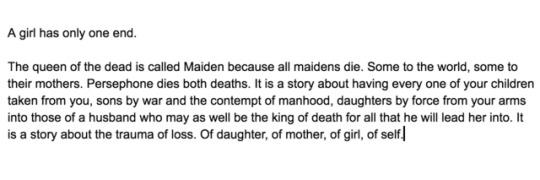


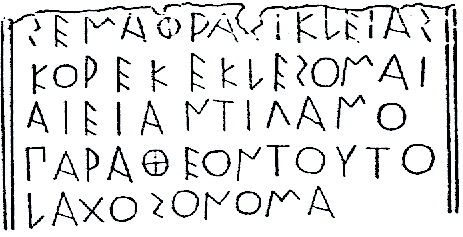




thoughts on death and marriage and girls
(sophocles, antigone 891-4, c. 441 bce; ovid, metamorphoses x.1-7, 8 ce; phrasikleia kore inscription, 550-530 bce; euripides, iphigenia in aulis 1502-3, 405 bce)
inspired by @regenderate and @risissecupido and also joan breton connelly and nicole loraux
#i want to write again#this is basically what my brain looks like#tagamemnon#mine#oh and i did this while listening to a playlist titled:#songs that should by all rights make me cry for specific reasons#im not gonna do the translations because its 1 am#but also i like it without translations#unintelligible. good.#to forbid that you should ever lose your screams#death and the maiden#rebecca writes
3K notes
·
View notes
Link
by TallQueen
One of the pitchfork guys stepped closer and tried to appear threatening. “You get the hell out of our village, mutant, and take yer scrappy prick of a bard with you.”
Geralt didn’t have time to think of another good response because Jaskier had already tackled the man to the ground.
(thank you to phrasikleia for the prompt on Tumblr!)
Words: 846, Chapters: 1/1, Language: English
Series: Part 1 of Tumblr Prompts
Fandoms: Wiedźmin | The Witcher - All Media Types, The Witcher (TV)
Rating: Teen And Up Audiences
Warnings: No Archive Warnings Apply
Categories: M/M
Characters: Geralt z Rivii | Geralt of Rivia, Jaskier | Dandelion
Relationships: Geralt z Rivii | Geralt of Rivia/Jaskier | Dandelion
Additional Tags: Tumblr Prompt, Gift Fic, Protective Jaskier | Dandelion, Feral Jaskier | Dandelion, Canon-Typical Violence, Anti-Witcher Sentiments, Jaskier | Dandelion Loves Geralt z Rivii | Geralt of Rivia, Established Relationship, Happy Ending, Geralt is Amused and also Mildly Frightened
13 notes
·
View notes
Quote
σῆμα Φρασικλείας. κούρη κεκλήσομαι αἰεί,
ἀντὶ γάμου παρὰ θεῶν τοῦτο λαχοῦσ’ ὄνομα.
“I am the tomb of Phrasikleia. Maiden I shall be called forever,
because I received this name from the gods instead of marriage.”
Funerary epigram ca. 540 BCE, translated by me
#literature#classics#tagamemnon#greek literature#ancient greek#quotes#btw i transcribed this from the athenian alphabet into standard#bc fuck that lol#what the fuck is σ῀εμα? i'll fucking kill you#sasha.txt
3 notes
·
View notes
Photo
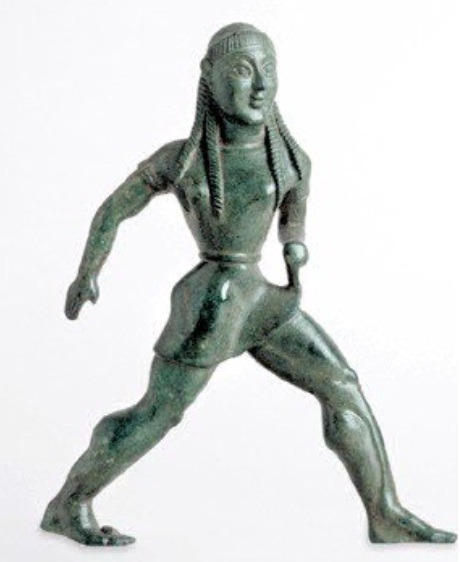

fashionable babes of antiquity: spartan girl runner ca 550 bce, cast bronze, and phrasikleia kore ca 550-540 bce, polychrome marble
16 notes
·
View notes
Link
TallQueen July 22, 2020 at 06:49PM
by TallQueen
One of the pitchfork guys stepped closer and tried to appear threatening. “You get the hell out of our village, mutant, and take yer scrappy prick of a bard with you.”
Geralt didn’t have time to think of another good response because Jaskier had already tackled the man to the ground.
(thank you to phrasikleia for the prompt on Tumblr!)
Words: 846, Chapters: 1/1, Language: English
Series: Part 1 of Tumblr Prompts
Fandoms: Wiedźmin | The Witcher - All Media Types, The Witcher (TV)
Rating: Teen And Up Audiences
Warnings: No Archive Warnings Apply
Categories: M/M
Characters: Geralt z Rivii | Geralt of Rivia, Jaskier | Dandelion
Relationships: Geralt z Rivii | Geralt of Rivia/Jaskier | Dandelion
Additional Tags: Tumblr Prompt, Gift Fic, Protective Jaskier | Dandelion, Feral Jaskier | Dandelion, Canon-Typical Violence, Anti-Witcher Sentiments, Jaskier | Dandelion Loves Geralt z Rivii | Geralt of Rivia, Established Relationship, Happy Ending, Geralt is Amused and also Mildly Frightened
1 note
·
View note
Text
i was overly excited today because i saw a colourised phrasikleia kore sculpture and that's how you know you're maybe a bit too into your degree
#i ranted about it on my instagram#it was also like 6 thirty in the morning#i wake up early because henry winter wakes up early#i'm kidding#am i#classics major#dark academia
1 note
·
View note
Text
The inscription on the pedestal of a funerary statue says: σεμα Φρασικλείας· κόρε κεκλέσομαι αἰεί ἀντὶ γάμο παρὰ θεον τοῦτο λαχοσ᾿ ὄνομα. Tomb of Phrasikleia. Maiden I must be called evermore; instead of marriage, by the Gods this name became my fate.
The statue of a young man from Smyrne says: “you ask, o wanderer, who the stele, who the tombstone / who in the image of the newly-made stele / exists. As the son of Tryphon I have / the same name, behind me fourteen cycles of life / such is what I was, but now / I am stele, I am sepulchre, stone and image.”
And the power of these statues is that they exist to represent something, someone, who is not there, they exist to be someone in absentia. But they are also something. Something that speaks to you, and as you read it aloud, there lies the magic. The lost is there, in the statue, and the statue made you say their name. Vicariously, the boy of Smyrne and Phrasikleia both live.
243 notes
·
View notes